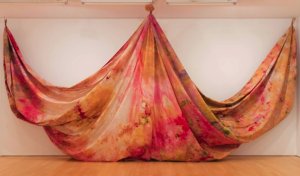All occurrences of this event have passed.
This listing is displayed for historical purposes.
Presented By: University of Michigan Museum of Art (UMMA)
Abstraction, Color, and Politics in the Early 1970s


Can abstract art be about politics? In the early 1970s, that question was hotly debated as artists, critics, and the public grappled with the relationship between art, politics, race, and feminism. Many of those debates centered on bringing to light the roles that gender and race played in how “great modern art” was defined and assessed, and on employing art to advance civil rights. Within this discourse, abstraction had an especially fraught role. To many, the decision by women artists and artists of color to make abstract art seemed to represent a retreat from politics and protest: an abnegation of a commitment to civil rights and feminism. "Abstraction, Color, and Politics in the Early 1970s" presents large-scale work by four leading American artists—Helen Frankenthaler, Sam Gilliam, Al Loving, and Louise Nevelson—who chose abstraction as a means of expression within the intense political climate of the early 1970s.
Lead support for "Abstraction, Color, and Politics in the Early 1970s" is provided by the University of Michigan Office of the Provost, Michigan Medicine, the Richard and Rosann Noel Endowment Fund, the Herbert W. and Susan L. Johe Endowment, and the University of Michigan Institute for Research on Women and Gender. Additional generous support is provided by the Robert and Janet Miller Fund and the University of Michigan Department of Political Science.
Lead support for "Abstraction, Color, and Politics in the Early 1970s" is provided by the University of Michigan Office of the Provost, Michigan Medicine, the Richard and Rosann Noel Endowment Fund, the Herbert W. and Susan L. Johe Endowment, and the University of Michigan Institute for Research on Women and Gender. Additional generous support is provided by the Robert and Janet Miller Fund and the University of Michigan Department of Political Science.
Back to Main Content
0 upcoming occurrences
0 expired occurrences
0 expired occurrences
When and Where
Map Museum of Art
September 2018
11:00am
- 5:00pm
October 2018
11:00am
- 5:00pm
11:00am
- 5:00pm
11:00am
- 5:00pm
11:00am
- 5:00pm
11:00am
- 5:00pm
November 2018
11:00am
- 5:00pm
11:00am
- 5:00pm
11:00am
- 5:00pm
11:00am
- 5:00pm
December 2018
11:00am
- 5:00pm
11:00am
- 5:00pm
11:00am
- 5:00pm
11:00am
- 5:00pm
January 2019
11:00am
- 5:00pm
11:00am
- 5:00pm
11:00am
- 5:00pm
11:00am
- 5:00pm
11:00am
- 5:00pm
February 2019
11:00am
- 5:00pm
11:00am
- 5:00pm
11:00am
- 5:00pm
11:00am
- 5:00pm
March 2019
11:00am
- 5:00pm
11:00am
- 5:00pm
11:00am
- 5:00pm
11:00am
- 5:00pm
April 2019
11:00am
- 5:00pm
11:00am
- 5:00pm
11:00am
- 5:00pm
11:00am
- 5:00pm
May 2019
11:00am
- 5:00pm
11:00am
- 5:00pm
11:00am
- 5:00pm
11:00am
- 5:00pm
11:00am
- 5:00pm
June 2019
11:00am
- 5:00pm
11:00am
- 5:00pm
11:00am
- 5:00pm
11:00am
- 5:00pm
July 2019
11:00am
- 5:00pm
11:00am
- 5:00pm
11:00am
- 5:00pm
11:00am
- 5:00pm
11:00am
- 5:00pm
August 2019
11:00am
- 5:00pm
11:00am
- 5:00pm
11:00am
- 5:00pm
11:00am
- 5:00pm
September 2019
11:00am
- 5:00pm
11:00am
- 5:00pm
11:00am
- 5:00pm
11:00am
- 5:00pm
September 2018
11:00am
- 5:00pm
October 2018
11:00am
- 5:00pm
11:00am
- 5:00pm
11:00am
- 5:00pm
11:00am
- 5:00pm
November 2018
11:00am
- 5:00pm
11:00am
- 5:00pm
11:00am
- 5:00pm
11:00am
- 5:00pm
11:00am
- 5:00pm
December 2018
11:00am
- 5:00pm
11:00am
- 5:00pm
11:00am
- 5:00pm
11:00am
- 5:00pm
January 2019
11:00am
- 5:00pm
11:00am
- 5:00pm
11:00am
- 5:00pm
11:00am
- 5:00pm
11:00am
- 5:00pm
February 2019
11:00am
- 5:00pm
11:00am
- 5:00pm
11:00am
- 5:00pm
11:00am
- 5:00pm
March 2019
11:00am
- 5:00pm
11:00am
- 5:00pm
11:00am
- 5:00pm
11:00am
- 5:00pm
April 2019
11:00am
- 5:00pm
11:00am
- 5:00pm
11:00am
- 5:00pm
11:00am
- 5:00pm
May 2019
11:00am
- 5:00pm
11:00am
- 5:00pm
11:00am
- 5:00pm
11:00am
- 5:00pm
11:00am
- 5:00pm
June 2019
11:00am
- 5:00pm
11:00am
- 5:00pm
11:00am
- 5:00pm
11:00am
- 5:00pm
July 2019
11:00am
- 5:00pm
11:00am
- 5:00pm
11:00am
- 5:00pm
11:00am
- 5:00pm
August 2019
11:00am
- 5:00pm
11:00am
- 5:00pm
11:00am
- 5:00pm
11:00am
- 5:00pm
11:00am
- 5:00pm
September 2019
11:00am
- 5:00pm
11:00am
- 5:00pm
11:00am
- 5:00pm
11:00am
- 5:00pm
September 2018
11:00am
- 5:00pm
October 2018
11:00am
- 5:00pm
11:00am
- 5:00pm
11:00am
- 5:00pm
11:00am
- 5:00pm
November 2018
11:00am
- 5:00pm
11:00am
- 5:00pm
11:00am
- 5:00pm
11:00am
- 5:00pm
11:00am
- 5:00pm
December 2018
11:00am
- 5:00pm
11:00am
- 5:00pm
11:00am
- 5:00pm
11:00am
- 5:00pm
January 2019
11:00am
- 5:00pm
11:00am
- 5:00pm
11:00am
- 5:00pm
11:00am
- 5:00pm
February 2019
11:00am
- 5:00pm
11:00am
- 5:00pm
11:00am
- 5:00pm
11:00am
- 5:00pm
March 2019
11:00am
- 5:00pm
11:00am
- 5:00pm
11:00am
- 5:00pm
11:00am
- 5:00pm
11:00am
- 5:00pm
April 2019
11:00am
- 5:00pm
11:00am
- 5:00pm
11:00am
- 5:00pm
11:00am
- 5:00pm
May 2019
11:00am
- 5:00pm
11:00am
- 5:00pm
11:00am
- 5:00pm
11:00am
- 5:00pm
11:00am
- 5:00pm
June 2019
11:00am
- 5:00pm
11:00am
- 5:00pm
11:00am
- 5:00pm
11:00am
- 5:00pm
July 2019
11:00am
- 5:00pm
11:00am
- 5:00pm
11:00am
- 5:00pm
11:00am
- 5:00pm
August 2019
11:00am
- 5:00pm
11:00am
- 5:00pm
11:00am
- 5:00pm
11:00am
- 5:00pm
11:00am
- 5:00pm
September 2019
11:00am
- 5:00pm
11:00am
- 5:00pm
11:00am
- 5:00pm
11:00am
- 5:00pm